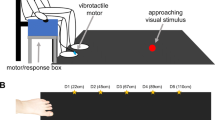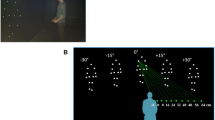Abstract
Peripersonal space is a multisensory interface between the environment and the body subserving motor interactions with the physical and social world. Although changing body properties has been shown to alter the functional processing of space, little is known about the effect of short-term limb immobilization specifically on the motor representation of peripersonal space. In the present study, we investigated the effect of a right upper-limb immobilization for a duration of 24 h on a reachability judgment task and a brightness judgment task. Analyses of perceptual thresholds revealed a reduction of peripersonal space representation after the immobilization period, which was not observed when there was no immobilization (control group). In contrast, no variation appeared in the brightness judgment task, suggesting no presence of specific visual perception or decisional deficits in the limb immobilization group. Considered together, the results confirm the crucial role of the motor system in the representation of peripersonal space. They also highlight the plasticity of the motor system resulting in a rapid change of its activity following limb immobilization, with a concomitant effect on motor-related perceptual and cognitive processes.



Similar content being viewed by others
References
Avanzino, L., Bassolino, M., Pozzo, T., & Bove, M. (2011). Use-dependent hemispheric balance. Journal of Neuroscience, 31, 3423–3428. https://doi.org/10.1523/JNEUROSCI.4893-10.2011.
Bartolo, A., Carlier, M., Hassaini, S., Martin, Y., & Coello, Y. (2014). The perception of peripersonal space in right and left brain damage hemiplegic patients. Frontiers in Human Neuroscience, 8, 3. https://doi.org/10.3389/fnhum.2014.00003.
Bartolo, A., Rossetti, Y., Revol, P., Urquizar, C., Pisella, L., & Coello, Y. (2018). Reachability judgement in optic ataxia: Effect of peripheral vision on hand and target perception in depth. Cortex, 98, 102–113. https://doi.org/10.1016/j.cortex.2017.05.013.
Bassolino, M., Bove, M., Jacono, M., Fadiga, L., & Pozzo, T. (2012). Functional effect of short-term immobilization: Kinematic changes and recovery on reaching-to-grasp. Neuroscience, 215, 127–134. https://doi.org/10.1016/j.neuroscience.2012.04.019.
Bassolino, M., Finisguerra, A., Canzoneri, E., Serino, A., & Pozzo, T. (2015). Dissociating effect of upper limb non-use and overuse on space and body representations. Neuropsychologia, 20, 385–392. https://doi.org/10.1016/j.neuropsychologia/2014.11.028.
Bourgeois, J., & Coello, Y. (2012). Effect of visuomotor calibration and uncertainty on the perception of peripersonal space. Attention, Perception & Psychophysics, 74(6), 1268–1283. https://doi.org/10.3758/s13414-012-0316-x.
Bourgeois, J., Farné, A., & Coello, Y. (2014). Costs and benefits of tool-use on the perception of reachable space. Acta Psychologica, 148, 91–95. https://doi.org/10.1016/j.actpsy.2014.01.008.
Brouillet, T., Heurley, L., Martin, S., & Brouillet, D. (2010). The embodied cognition theory and the motor component of “yes” and “no” verbal responses. Acta Psychologica, 134, 310–317. https://doi.org/10.1016/j.actpsy.2010.03.003
Canzoneri, E., Ubaldi, S., Rastelli, V., Finisquerra, A., Bassolino, M., & Serino, A. (2013). Tool-use reshapes the boundaries of body and peripersonal space representations. Experimental Brain Research, 228(1), 25–42. https://doi.org/10.1007/s00221-013-3532-2.
Cardinali, L., Brozzoli, C., Urquizar, C., Salemme, R., Roy, A. C., & Farnè, A. (2011). When action is not enough: tool-use reveals tactile-dependent access to body schema. Neuropsychologia, 49, 3750–3757. https://doi.org/10.1016/j.neuropsychologia.2011.09.033.
Cardinali, L., Jacobs, S., Brozzoli, C., Frassinetti, F., Roy, A. C., & Farnè, A. (2012). Grab an object with a tool and change your body: tool-use-dependent changes of body representation for action. Experimental Brain Research, 218, 259–271. https://doi.org/10.1007/s00221-012-3028-5.
Christamn, S. D., & Niebauer, C. L. (1997). The relation between left-right and upper-lower visual field differences. In S. Christman (Ed.), Cerebral asymmetries in sensory and perceptual processing (pp. 263–298). Amsterdam: Elsevier.
Cléry, J., Guipponi, O., Wardak, C., Hamed, B., S (2015). Neuronal bases of peripersonal and extrapersonal spaces, their plasticity and their dynamics: knowns and unknowns. Neuropsychologia, 70, 313–326. https://doi.org/10.1016/j.neuropsychologia.2014.10.022.
Coello, Y. (2018). Action space representation in social contexts. In Shigemasu, K., Kuwano, S., Sato, T., Matsuzawa, T. (Eds.), Diversity in harmony—insights from psychology. Proceedings of the 31st international congress of psychology. https://doi.org/10.1002/9781119362081.ch12.
Coello, Y., Bartolo, A., Amiri, B., Houdayer, E., & Derambure, P. (2008). Perceiving what is reachable depends on motor representations: A study using transcranial magnetic stimulation. Plos One, 3(8), e2862. https://doi.org/10.1371/journal.pone.0002862.
Coello, Y., Bonnotte, I. (2013). The mutual roles of action representations and spatial deictics in French language. Quarterly Journal of Experimental Psychology, 66(11), 2187–2203. https://doi.org/10.1080/17470218.2013.775596.
Coello, Y., Bourgeois, J., & Iachini, T. (2012). Embodied perception of reachable space: how do we manage threatening objects ? Cognitive Processing, 13, S131–S135. https://doi.org/10.1007/s10339-012-0470z.
Coello, Y., & Iachini, T. (2016). Embodied perception of objects and people in space: towards a unified thoretical framework. In Y. Coelle & M. Fischer (Eds.), Foundations of embodied cognition (pp. 198–219). New York: Psychology Press.
Coltheart, M., Rastle, K., Perry, C., Ziegler, J., & Langdon, R. (2001). DRC: A Dual Route Cascaded model of visual word recognition and reading aloud. Psychological Review, 108, 204–256. https://doi.org/10.1037/0033-295X.108.1.204.
Costantini, M., Ambrosini, E., Tieri, G., Sinigaglia, C., & Committeri, G. (2010). Where does an object trigger an action? An investigation about affordances in space. Experimental Brain Research, 207(1–2), 95–103. https://doi.org/10.1007/s00221-010-2435-8.
Curcio, C. A., & Allen, K. A. (1990). Topography and ganglion cells in the human retina. Journal of Comparative Neurology, 300, 5–25.
Danckert, J., & Goodale, M. A. (2001). Superior performance for visually guided pointing in the lower visual field. Experimental Brain Research, 137, 303–308.
De Vignemont, F., & Iannetti, G. D. (2015). How many peripersonal spaces? Neuropsychologia, 70, 327–334. https://doi.org/10.1016/j.neuropsychologia.2014.11.018.
Di Pellegrino, G., & Làdavas, E. (2015). Peripersonal space in the brain. Neuropsychologia, 66, 126–133. https://doi.org/10.1016/j.neuropsychologia.2014.11.011.
Facchini, S., Romani, M., Tinazzi, M., & Aglioti, S. M. (2002). Time-related changes of excitability of the human motor system contingent upon immobilization of the ring and little fingers. Clinical Neurophysiology, 113, 367–375.
Grade, S., Pesenti, M., & Edwards, M. G. (2015). Evidence for the embodiment of space perception: concurrent hand but not arm action moderates reachability and egocentric distance perception. Frontiers in Psychology, 6, 862. https://doi.org/10.3389/fpsyg.2015.00862.
Grainger, J., & Jacobs, A. M. (1996). Orthographic processing in visual word recognition: A multiple readout model. Psychological Review, 103, 518–565.
Graziano, M. S., & Gandhi, S. (2000). Location of the polysensory zone in the precentral gyrus of anesthetized monkeys. Experimental Brain Research, 135(2), 259–266.
Graziano, M. S., & Cooke, D. F. (2006). Parieto-frontal interactions, personal space, and defensive behavior. Neuropsychologia, 44(13), 2621–2635.
Handy, T. C., Grafton, S. T., Shroff, N. M., Ketay, S., & Gazzaniga, M. S. (2003). Graspable objects grab attention when the potential for action is recognized. Nature Neurosciences, 6, 421–427. https://doi.org/10.1038/nn1031.
Huber, R., Ghilardi, M. F., Massimini, M., Ferrarelli, F., Riedner, B. A., Peterson, M. J., & Tononi, G. (2006). Arm immobilization causes cortical plastic changes and locally decreases sleep slow wave activity. Nature Neuroscience, 9, 1169–1176. https://doi.org/10.1038/nn1758.
Hunley, S. B., & Lourenco, S. F. (2018). What is peripersonal space? An examination of unresolved empirical issues and emerging findings. Wiley Interdisciplinary Reviews (Cognitive Science), e1472. https://doi.org/10.1002/wcs.1472.
Lakha, L., & Humphreys, G. (2005). Lower visual field advantage for motion segmentation during high competition for selection. Spatial Vision, 18, 447–460.
Meugnot, A., Almecija, Y., & Toussaint, L. (2014). The embodied nature of motor imagery processes highlighted by short-term limb immobilization. Experimental Psychology, 61, 180–186. https://doi.org/10.1027/1618-3169/a000237.
Meugnot, A., & Toussaint, L. (2015). Functional plasticity of sensorimotor representations following dominant versus non-dominant hand short-term immobilization. Acta Psychologica, 155, 51–56.
Moisello, C., Bove, M., Huber, R., Abbruzzese, G., Battaglia, F., Tononi, G., & Ghilardi, M. F. (2008). Short-term limb immobilization affects motor performance. Journal of Motor Behavior, 40, 165–176. https://doi.org/10.3200/JMBR.40.2.165-176.
Oldfield, R. C. (1971). The assessment and analysis of handedness: the Edinburgh inventory. Neuropsychologia, 9, 97–113.
Olejnik, S., & Algina, J. (2003). Generalized eta and omega squared statistics: measures of effect size for some common research designs, 8(4), 434–447. https://doi.org/10.1037/1082-989X.8.4.434.
Patané, I., Farnè, A., & Frassinetti, F. (2017). Cooperative tool-use reveals peripersonal and interpersonal spaces are dissociable. Cognition, 166, 13–22. https://doi.org/10.1016/j.cognition.2017.04.013.
Previc, F. H. (1998). The neuropsychology of 3-D space. Psychological Bulletin, 124(2), 123–164.
Rizzolatti, G., Scandolara, C., Matelli, M., & Gentilucci, M. (1981). Afferent properties of periarcuate neurons in macaque monkeys. II. Visual responses. Behavioral Brain Research, 2(2), 147–163.
Ruggiero, G., Frassinetti, F., Coello, Y., Rapuano, M., di Cola, A. S., & Iachini, T. (2017). The effect of facial expressions on peripersonal and interpersonal spaces. Psychological Research Psychologische Forschung, 81(6), 1232–1240. https://doi.org/10.1007/s00426-016-0806-x.
Shirley, P., & Morley, K. (2008). Realistic Ray Tracing. Natick: A.K. Peters.
Toussaint, L., & Meugnot, A. (2013). Short-term limb immobilization affects cognitive motor processes. Journal of Experimental Psychology: Learning, Memory and Cognition, 39, 623–632. https://doi.org/10.1037/a0028942.
Valdés-Conroy, B., Román, F. J., Hinojosa, J. A., & Shorkey, S. P. (2012). So far so good: emotion in the peripersonal/extrapersonal space. PLoS One, 7(11), e49162. https://doi.org/10.1371/journal.pone.0049162.
Wamain, Y., Gabrielli, F., & Coello, Y. (2016). EEG µ rhythm in virtual reality reveals that motor coding of visual objects in peripersonal space is task dependent. Cortex, 74, 20–30. https://doi.org/10.1016/j.cortex.2015.10.006.
Author information
Authors and Affiliations
Corresponding author
Ethics declarations
Ethical standards
The study has been approved by the ethics committee for research in science of physical and sports activities and has, therefore, been performed in accordance with the ethical standards laid down in the 1964 Declaration of Helsinki and its later amendments.
Informed consent
All participants gave their informed consent prior to their inclusion in the study. Details that might disclose the identity of the participants have been omitted.
Conflict of interest
The authors declare that no conflict of interest exists. Moreover, they have full control of all primary data and they agree to allow the journal to review their data if requested.
Rights and permissions
About this article
Cite this article
Toussaint, L., Wamain, Y., Bidet-Ildei, C. et al. Short-term upper-limb immobilization alters peripersonal space representation. Psychological Research 84, 907–914 (2020). https://doi.org/10.1007/s00426-018-1118-0
Received:
Accepted:
Published:
Issue Date:
DOI: https://doi.org/10.1007/s00426-018-1118-0




